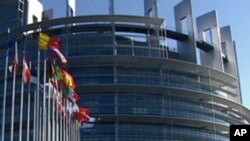The European Union is criticizing Turkey for the rising number of prosecutions against journalists. E.U. concerns have been raised in an annual progress report on the country's bid to join the bloc.
The annual European Union report on Turkey said while there is increasing open and free debate over sensitive issues such as minority rights, concerns were raised over press freedom.
A member of the European Parliament committee on Turkey, Richard Howitt, addressed the bloc's concerns.
"Without doubts, over some years now we have raised issues about websites being blocked, about writers being in jail. There are still too many journalists in jail," said Howitt.
According to human-rights groups, the number of jailed journalists has steadily increased in the past few years, reversing an earlier decline.
Last month, the international media watchdog Reporters Without Borders noted Turkey had slipped in its ranking of press freedom this year to 138 from 123 in 2009, now occupying a spot between Singapore and Ethiopia.
The EU report also voices its concern over the pressure on media organizations. It cited the billion-dollar tax fine against the country's largest media group, which is also seen as being critical of the government. But the government has dismissed such concerns, saying there is no policy of intimidation, and the judiciary is independent.
Last month, CNN Turk, the Turkish version of the popular cable news channel CNN, was fined and received a warning from the state body that monitors media activity. CNN Turk had presented an interview that was deemed to have been personally critical of the prime minister and president. The warning sent shock waves through the media.
The anchor and editor of one of country's main news TV shows, Mehmet Ali Birand, says critical reporting is becoming increasingly difficult.
"Well everyone is going to be much more careful on what they say. No criticism will be the order of the day. We will not be able say anything wrong, which will be interpreted in a negative way from the prime minister."
Birand's program is also under investigation and facing a heavy fine for interviewing family members of soldiers killed by the Kurdistan Workers' Party.
The EU report also cited the growing number of Internet sites being closed by the courts as another area of concern. There are nearly 6,000 sites that are banned.
Earlier this month, a two-and-one-half-year ban was lifted on "YouTube," but only days later another ban was enforced. The popular social networking site Facebook also may be banned. In all the cases, a court found the content of certain Web pages seditious or disrespectful.
Media Studies Professor Haluk Sahin, of Istanbul's Bilgi University, says the situation is out of control.
"Turkey finds itself mentioned alongside autocratic countries such as Iran and North Korea and Sudan - amongst the worst censors of the Internet. But you talk to politicians, like the president, President Gul says, you know, we do not like stuff like this, but nobody seems to move a finger."
The minister for EU affairs, Ergemen Bagis, responded to the report, saying there were no surprises in it. But with strong opposition to Turkey's bid from country's like Germany and France, political scientist Cengiz Aktar of Bahcesehir University says the accession process has come to virtual halt.
"Turkey's E.U. relation is dying every day. It has become an open-ended process. Plus negative remarks by [French President Nicolas] Sarkozy, made this process a genuine disincentive."
Apathy is seen as a major reason why the latest EU report received little media coverage in Turkey. In the past, it dominated the headlines. But some critics say the media may be more reluctant to carry critical news of the government these days.




